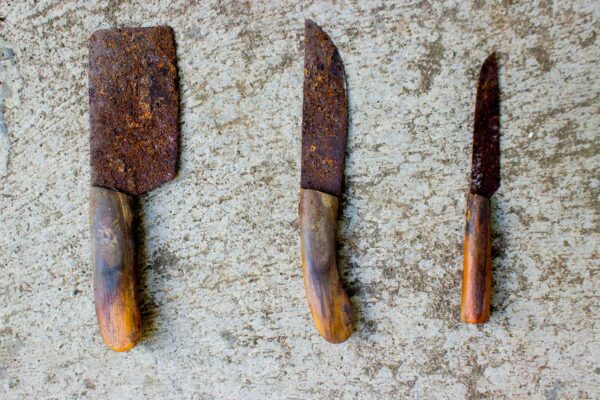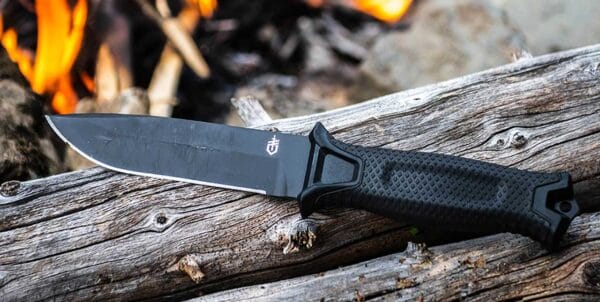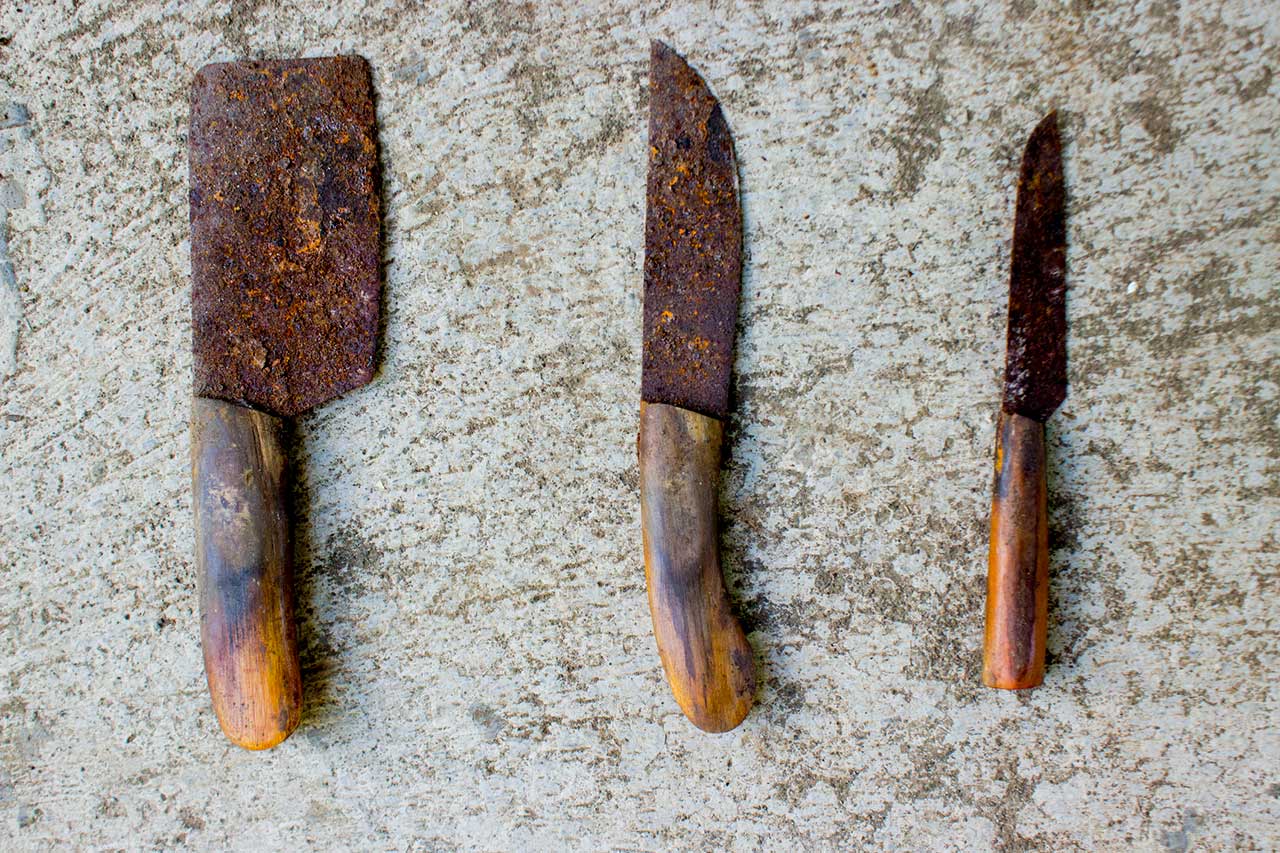Opinion

There’s nothing worse than pulling out your knife only to find it speckled with rust. Whether you’re carrying a knife daily for work, relying on one for survival situations, or keeping one handy for outdoor adventures, rust is an unwelcome sight. But don’t worry—rust isn’t the end of the road. With a little know-how, you can restore your blade and keep it in top condition for years to come.
Why Rust Happens (Even to Stainless Steel)
Rust is the natural enemy of metal, forming when iron reacts with oxygen and moisture. Even stainless steel—despite its name—is not immune. That’s why high-use knives, like my goto knife, the Gerber StrongArm Fixed Blade, benefit from a tough ceramic coating and 420HC steel, which improves corrosion resistance.
But even the best knives need care. Exposure to humidity, sweat, and water can accelerate rust formation, making proper maintenance essential.
Simple Methods to Remove Rust From Your Knife
If your blade starts to show signs of corrosion, don’t panic. Here are some tried-and-true techniques to remove rust and restore your knife to its original glory.
1. The Rust Eraser & Metal Polish Method
For those who take knife care seriously, the Dalstrong Rust Eraser and metal polish are the go-to solutions.
- Scrub rust spots with a rust eraser, applying firm pressure.
- Wipe away eraser debris and apply a small amount of metal polish.
- Use a microfiber cloth to buff the blade in small circular motions.
- Rinse and dry thoroughly.
2. Vinegar Soak for Deep Rust Removal
A vinegar soak can work wonders if your blade has seen some serious neglect.
- Submerge the blade in white vinegar for 30 minutes to overnight.
- Scrub with a sponge or brush to remove loosened rust.
- Wash with dish soap, rinse thoroughly, and dry immediately.
3. Baking Soda Scrub
For lighter rust, a simple baking soda paste does the trick.
- Mix baking soda with water to form a thick paste.
- Apply to rust spots and let sit for about an hour.
- Scrub with a sponge and rinse clean.
4. The Unlikely Hero: The Potato Trick
It may sound odd, but potatoes contain oxalic acid, which helps break down rust.
- Slice a potato in half and coat the cut side with dish soap and salt.
- Scrub the blade until the rust fades.
- Rinse and dry thoroughly.
Keeping Your Knife Rust-Free
Rust removal is great, but prevention is even better. To keep your Gerber StrongArm or any blade in prime condition:
- Keep it dry: After cleaning or use, dry your blade completely before storage.
- Apply a light oil coating: A dab of gun oil, mineral oil, or silicone cloth can create a protective barrier.
- Store properly: Avoid leaving knives in damp environments. If possible, store in a dry case or use a desiccant.
Why I Love My Gerber StrongArm

If you’re looking for a knife that can withstand harsh conditions, I can recommend the Gerber StrongArm Fixed Blade is a top choice. Designed for durability and versatility, this knife features:
- A full tang 420HC steel blade with a ceramic coating for added corrosion resistance.
- A rubberized diamond-texture grip ensures a secure hold even in wet conditions.
- A MOLLE-compatible sheath allows multiple carry options, whether on a belt or a pack.
- A striking pommel, perfect for emergency situations.
Made in the USA and backed by Gerber’s limited lifetime warranty, the StrongArm is a knife that will serve you well for years—with just a little routine maintenance.
Live Inventory Price Checker

|
Gerber StrongArm 4.8 inch Fixed Blade Knife - Coyote | Sportsman's Warehouse | $ 89.99 |
|

|
Gerber Strongarm 4.8 inch Fixed Blade Knife - Black | Sportsman's Warehouse | $ 89.99 |
|

|
Gerber Strongarm Camp 4.1 inch Fixed Blade Knife - Grey - Grey | Sportsman's Warehouse | $ 90.00 |
|

|
Gerber Principle 3.25 inch Fixed Blade Knife - Coyote Brown | Sportsman's Warehouse | $ 67.99 |
|
Final Thoughts
Knives are tools that should be ready when you need them. Keeping your blade clean, dry, and free from rust will extend its lifespan and ensure it’s always up for the task. A little care goes a long way, whether you’re using a Gerber StrongArm in the field or keeping a pocketknife in your EDC lineup. Stay sharp, stay prepared, and never let rust get the best of your blade.
About Thomas Conroy
Thomas Conroy is a firearms aficionado and writer who lives in the Midwest.






Anyone ever hear of Ballistol? Hickok 45 swears by it. It is even edible though too expensive for food….LOL
I’ve used CLP on my ax, saws, hatchet, knives and guns to clean, lubricate, and protect my weapons and equipment at home or in the woods, great stuff. I put it on anything metal on my vehicles and around the house that shows rust. First introduced to CLP while in the military to clean, lubricate, and protect our gear and weapons.
Interesting article. Thanks for sharing.
Or use Breakfree CLP (Cleaner/Lubricant/Preservative). I’ve read two reports, years apart from each other, on rust prevention products for guns. In both cases, they subjected steel to salt-water sprays for hours or days, and Breakfree CLP the clear winner.
My favorite method of keeping my tools and firearms rust-free is to first disassemble and thoroughly clean and dry the item. Second, I work powdered molybdenum disulfide into every surface, usually mixed with with mineral oil. Third, I watch my stuff not rust. Yeah, that’s all there is to it. The moly coating also adds dry lubrication as well as preventing corrosion. It will change the color of metal slightly, and can appear patchy until thoroughly worked in to the surface, but that seems to be the biggest drawback. A couple of quick and inexpensive sources are: Molybdenum Disulfide powder… Read more »